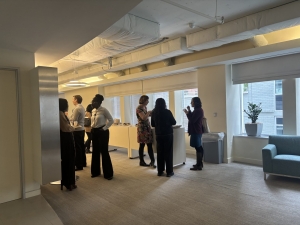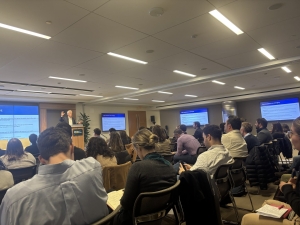A Glimpse from the Second Forced Displacement Working Group Meeting
On November 15, 2024, PDRI-DevLab, in collaboration with the Center for Global Development (CGD), Immigration Policy Lab (IPL), and Innovations for Poverty Action (IPA), successfully hosted the second Forced Displacement Working Group (FDWG) meeting at the CGD headquarters in Washington, D.C.
Building on the inaugural May 2024 conference, which explored sustainable livelihoods, social cohesion challenges, and data innovations for displaced populations, this meeting furthered the dialogue by focusing on climate-driven displacement, impact evaluations, funding sources, and mobility policies.
The event brought together leading researchers, practitioners, and policymakers committed to advancing evidence-based solutions for forcibly displaced populations. Discussions were structured into three key sessions:
1. Climate and Displacement
This session examined the intersection of climate change and forced displacement, delving into tools like the Climate Mobility Dashboard, anticipatory responses to climate crises, and climate insurance initiatives in Sub-Saharan Africa. The session highlighted predictive technologies, proactive strategies, and resilience-building measures to address mobility challenges driven by environmental changes.
2. Impact Evaluations and Funding Opportunities
Focusing on the long-term impacts of programs like the Djibouti Financial Inclusion Initiative and the DAFI Scholarship Program, this session also covered the scalability of initiatives aimed at improving education, financial inclusion, and livelihoods for displaced populations. Innovative funding models to support displacement-related needs were also discussed.
3. Mobility and Policy Challenges
This session explored the complexities of migration policies, the settlement patterns of displaced populations, and the development of essential datasets on refugees and asylum seekers. Topics also included burden-sharing mechanisms, hosting policies, and the financial implications of displacement, shedding light on the intricate challenges of managing forced mobility.
In addition to these key sessions, the meeting included lightning talks on a wide range of topics, from refugee perceptions of resettlement policy to climate risks and refugee self-reliance.
As always, the FDWG meeting fostered collaboration and knowledge exchange between researchers, policymakers, and practitioners, working together to improve evidence-based decision-making in the context of forced displacement.
Here are some pictures from the event that capture the energy and collaboration of the day:




The FDWG continues to be a vital platform for advancing global solutions for forcibly displaced populations, and we look forward to the next opportunity to convene and deepen this essential dialogue.

